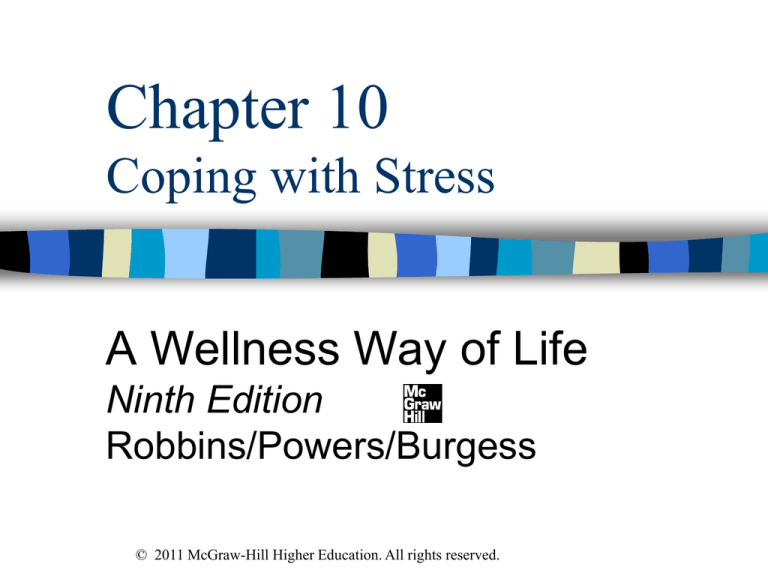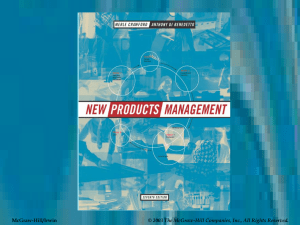
Chapter 10
Coping with Stress
A Wellness Way of Life
Ninth Edition
Robbins/Powers/Burgess
© 2011 McGraw-Hill Higher Education. All rights reserved.
Chapter 10 Objectives
After reading this chapter, you will be able to:
1.
2.
3.
4.
5.
6.
7.
8.
9.
10.
11.
Define the terms, stress, stressor, and stress response.
Explain the three stages of the stress response.
Define and give examples of eustress, distress, optimal stress, acute
stress, and chronic stress.
Explain how perception and control are involved in stress.
On the Life Event Stress Test, measure the number of life changes
you have encountered this year and be able to predict your
susceptibility to a stress-related illness.
Explain the difference between daily hassles and daily uplifts and how
each affects overall health.
Describe six harmful effects of too much stress.
Contrast Type A, Type B, Type C and Type D personalities.
Identify four questions that can be asked to manage and modify
angry/hostile behavior.
List at least six strategies for managing stress.
Define and list at least five benefits of the relaxation response.
© 2011 McGraw-Hill Higher Education. All rights reserved.
Stress
Stress: nonspecific response of the human
organism to any demand made upon it.
Stressor: factor causing stress.
Acute stress: body’s response to imminent
danger – most common type.
Chronic stress: caused by prolonged
physical or emotional stress, more than can
be coped with.
Optimal stress: stress is intense enough to
motivate and physically prepare us to
perform well but not enough to cause harm.
Distress: negative stress
Eustress: positive stress
© 2011 McGraw-Hill Higher Education. All rights reserved.
Copyright © The McGraw-Hill Companies, Inc. Permission required for reproduction or display.
Stress and the Relationship to Health Performance
© 2011 McGraw-Hill Higher Education. All rights reserved.
Three-Stage Stress Response
Regardless of the cause, the reaction to
stressor is both psychological and
physiological and leads to the stress
response.
Alarm Reaction: fight or flight physiological
and psychological responses appear.
Resistance: body tries to cope with the fight
or flight reaction through organ systems. If
the resistance stage is maintained, it can
lead to stress-related disease.
Exhaustion: resistance eventually fails and
signs of alarm reappear. Disease and
disability can result.
© 2011 McGraw-Hill Higher Education. All rights reserved.
Perception and Control
Whether a particular stressor causes a
negative reaction depends on whether the
person perceives that stressor as being
negative.
Some people’s problems are related to faulty
perceptions.
Control is a major factor. The perception of not
having control is very stressful.
People who handle stress best tend to control
their lives and look for active solutions to the
problems and circumstances of their lives.
© 2011 McGraw-Hill Higher Education. All rights reserved.
Ways to Gain Control Over Your
Life
Recognize and understand what causes your
stress.
Make healthy lifestyle decisions.
Learn and implement time management
skills.
Learn when to say no.
Regularly practice relaxation techniques and
employ often the other stress-coping
strategies found in the chapter.
© 2011 McGraw-Hill Higher Education. All rights reserved.
Harmful Effects of Stress
Psychosomatic disease: physical ailment
that is mentally induced.
The following can be developed by stress:
• Hypertension
• Stroke
• Cardiovascular disease
• Ulcers
• Migraine headaches
• Tension headaches
• Addictions
• Cancer
• Allergies
• Asthma
• Hay fever
• Rheumatoid arthritis
• Backache
• Depression
© 2011 McGraw-Hill Higher Education. All rights reserved.
Psychoneuroimmunology and Stress
Specialized branch of medicine that studies
the mind-body connection.
Chronic negative emotions deplete the
immune system.
Chronic stress and stress perceptions can
damage the immunity system.
Managing our stress is paramount. What we
think and feel can affect our physical and
psychological health.
Stress management techniques that calm the
mind and shift negative thinking can be
helpful.
© 2011 McGraw-Hill Higher Education. All rights reserved.
Cell Division and Telomeres
Telomeres, found on the strands of DNA that
make up our chromosomes, are like the little
plastic tips covering the ends of shoelaces
that keep the strands from unraveling.
The telomeres of people that have chronic
stress are almost 50% shorter.
Once the telomere is gone, the DNA begins
to fray and cannot be used, ultimately
contributing to aging.
© 2011 McGraw-Hill Higher Education. All rights reserved.
Daily Hassles and Uplifts
Daily hassles are the events or interactions in your daily
life that you find bothersome, annoying or negative.
Daily hassles may be more detrimental to your health
than major negative life events.
Daily uplifts are positive events that make us feel good
and can reverse the negative effects of daily hassles.
A balance between hassles and uplifts, or allowing
yourself to feel more uplifts, can be the key to better
wellness.
Pay attention to the uplifts. Allow yourself to feel happy
– even about small things.
Make a list of your hassles. What can you avoid or
delete? Make a list of your uplifts. How can you notice
more blessings?
© 2011 McGraw-Hill Higher Education. All rights reserved.
Personality Type
Type A
Stressed, hurried,
angry, hostile,
organized, on time.
Body produces an extra
amount of stress
hormones.
Take the positive
qualities and reduce
anger and hostility.
Type B
Procrastinate, weight
gain, creative, laid back,
no worries.
Take the good and
reduce putting off
responsibilities.
© 2011 McGraw-Hill Higher Education. All rights reserved.
Personality Types
Type D
Distressed personality
with negative emotions.
Tends to be depressed,
anxious, and insecure.
Exercise, relaxation and
a healthy diet can help.
The Hot Reactor
Produce a large amount
of harmful catecholamines
when stressed that
damage the heart and
increase risk for sudden
heart attack.
Faulty perceptions of
stressor – perceive nearly
every stressor as life and
death.
Could be any personality
type.
Reframing, thought
stopping, and relaxation
are important.
© 2011 McGraw-Hill Higher Education. All rights reserved.
Anger / Hostility Behavior
Modification Techniques
Ask 4 questions:
Is this situation really important?
Is this anger appropriate for
this situation?
Is this action modifiable?
Is this situation worth dying for?
Reframing thought is also an excellent way to
calm hot, angry reactions to stress.
© Royalty-Free/Corbis
© 2011 McGraw-Hill Higher Education. All rights reserved.
Other Stress Reduction Tips
Remind yourself that you are not in charge of everything or
everyone.
Identify things that cause you stress and how to get around
them.
Complete one task at a time and allow yourself to feel good
about getting it done before moving on.
Plan to allow for extra time to do things and get places.
Say “NO”!
Live within your budget.
Worry about only the things you can control.
Weed out trivial things in your life. Unclutter your life.
Live in the present.
Journal the things you are thankful for each day.
SLOW DOWN!
© 2011 McGraw-Hill Higher Education. All rights reserved.
The Stress-Resistant, Hardy Person
Type C personalities are hardy and possess the
following five traits.
Control – internal control of self.
Commitment – to meaningful involvement in
life.
Challenge – is an opportunity rather than a
threat.
Choices – lifestyle choices that enhance
health. You always have a choice on how you
react to life.
Connectedness – network of social support,
helping and being helped by others.
© 2011 McGraw-Hill Higher Education. All rights reserved.
Stress Management Skills
How you perceive and manage the stressor is
more important than the amount of stress.
Exercise
Relaxation techniques
Lifestyle changes
Reframing
Laughter and humor
Creating a memory bank
Avoid negative coping methods – drugs,
alcohol, cigarettes, sex, shopping, gambling,
violence, etc.
© 2011 McGraw-Hill Higher Education. All rights reserved.
Exercise
Aerobic exercise promotes health and energy
and is a powerful antidote for stress, anxiety,
and even moderate depression.
Many physicians prescribe exercise instead
of medications or tranquilizers.
Exercise aids in the resistance phase of the
stress response.
Exercise is a natural way to relax and renew
energy.
Exercise can change brain chemistry.
© 2011 McGraw-Hill Higher Education. All rights reserved.
Relaxation Techniques
Practice the following relaxation techniques to
find the one that you feel most comfortable
using and that works for you.
Meditation
Autogenic training and imagery
Jacobson’s Progressive Relaxation
Abdominal breathing
Hatha Yoga
Massage
Biofeedback Training
© 2011 McGraw-Hill Higher Education. All rights reserved.
Lifestyle Change
Eat a healthy diet
Practice time management
Avoid alcohol, drugs, and cigarettes
Get 7-9 hours of restful sleep
Develop satisfying relationships
Learn when to seek the help and support
of others
Schedule “Me Time” and listen to music.
© 2011 McGraw-Hill Higher Education. All rights reserved.
Reframing
Consciously reinterpreting a situation in
a more positive light.
Reframe life’s stumbling blocks into
challenges.
Look on the bright side, take control of
your reactions, learn to be an optimist.
Optimists have higher hardiness scores.
© 2011 McGraw-Hill Higher Education. All rights reserved.
Laughter and Humor
Can provide psychological relief from tension,
anxiety, anger, hostility, and emotional pain.
Laughing is internal jogging as it causes endorphins
to be released in the brain. It helps relax the blood
vessels and blood circulation.
It provides a greater sense of control, lowers stress
hormones, and improves immune function.
Try to see the humor in everyday situations and don’t
be afraid to laugh at yourself.
Avoid humor that is at someone else’s expense.
© 2011 McGraw-Hill Higher Education. All rights reserved.
Create a Memory Bank
Happiness comes from noticing and
enjoying the little things in life.
Savor special experiences of your life
and store them in your memory bank.
Journaling will help you remember
them.
Allow yourself to remember pleasant
things and feel happy.
© 2011 McGraw-Hill Higher Education. All rights reserved.
Rx for Action
Think of an act of kindness and then do it for a stranger.
Get 8 hours of sleep tonight.
Go to a humorous or uplifting movie or get a video/DVD of one.
Reflect on the meaningful people in your life. Connect with two of
them today via e-mail, telephone, or letter.
Watch a sunset tonight and/or a sunrise tomorrow.
Get your study area organized.
Write in a journal. Record the best things that have happened to
you this week.
Volunteer your services to a worthy project/group that interests
you.
Arrive early to every class/job and all appointments tomorrow.
Take a break from emailing/texting.
© 2011 McGraw-Hill Higher Education. All rights reserved.
What Do You Think?
What are your most common stressors?
What creates eustress for you, and what creates
distress?
How could you change or shift your perceptions of
your stressors?
What are your daily hassles and daily uplifts? How
could you decrease the hassles and/or increase the
uplifts?
Have you ever experienced harmful effects from
stress?
What is your personality type?
What is the best strategy for reducing stress for you?
How often do you practice it?
© 2011 McGraw-Hill Higher Education. All rights reserved.
Questions?
© 2011 McGraw-Hill Higher Education. All rights reserved.






